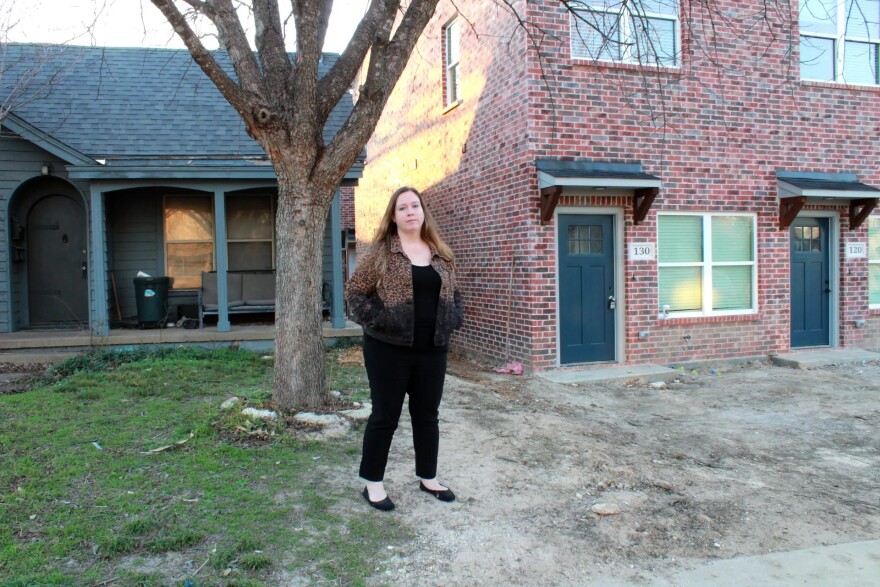Preventing “stealth dorms” and ensuring new developments are compatible with residential neighborhoods on the city’s south side is the goal of a Fort Worth plan to rezone more than 386 acres, officials said.
The zoning request — initiated by City Council members Elizabeth Beck and Jeanette Martinez — will affect several neighborhoods in their districts. The area is generally bounded by Berry Street, BNSF railroad line, Biddison Street, Hemphill Street, Seminary Drive, Lubbock Avenue, Pafford Street, McCart Avenue and Cleburne Road.
Most zoning for that area, dating back to 1940, would allow for multifamily housing and some limited commercial uses.
The proposed zoning is intended to preserve “the character of suburban residential neighborhoods” while encouraging new developments to complement existing homes and buildings in scale and with similar architectural elements, city staffers wrote.
Cristina Plascencia Snoke, a Rosemont Neighborhood Association member who was raised in the community, told commissioners that she supported the change because it would enable other families to live and thrive in the close-knit area.
“This is something so meaningful to me,” she said.
Infill development would be encouraged to be compatible with nearby neighborhoods, according to the proposed changes. The zoning changes would align with the city’s comprehensive plan, according to a city staff report.
The plan — discussed by the Fort Worth Zoning Commission at an Oct. 8 meeting — would eliminate high-density multifamily developments in the area and add conditional use permits for some businesses, such as auto repair shops, screen printers, and window and door manufacturers. Projects already in the zoning process, such as duplexes, would be grandfathered.
The commission is expected to vote on the matter next month.
Dense housing concerns
Concerns about high-density housing — sometimes called stealth dorms — near Texas Christian University prompted the zoning change.
The proposal includes a portion of the Rosemont area that is in the Berry/University Urban Village. That district has a set of development standards to promote mixed-use, walkable areas.
“We have a lot of high-density (housing) going up in the community,” Plascencia Snoke said, alluding to stealth dorms on the outskirts of Rosemont.
In 2023, a vacant lot on Stanley Avenue was transformed when two two-story triplexes, totaling six units, were built next to single-family homes.
“I do remember seeing what happened in the Paschal neighborhood with the stealth dorms,” Calvin Huezo, president of the Rosemont Neighborhood Association and a Paschal High School graduate, previously told the Fort Worth Report. “I remember that those were houses, and now they’re stealth dorms. I thought it was going to be only that area that they were developing like that.”
Plascencia Snoke said she oversaw the Rosemont neighborhood’s efforts over the summer to rezone nearby areas.
She said preserving the character of Rosemont is important to her.
“I feel very emotional about my community,” Plascencia Snoke said.
Continuing case
Rosemont is filled with single-family homes, duplexes and small commercial sites.
Arthur McCoy Jr., a former City Council candidate, told commissioners he opposed the proposal because he wants to build a duplex on vacant property his grandfather purchased in 1980.
“Fort Worth already has a housing shortage,” he said, adding that the rezoning would hinder his project and cost him money since he already developed plans and is prepared to begin site work.
Zoning officials told McCoy the proposal would be “renoticed” and considered for a vote at the panel’s November meeting since it did not include conditional use permits for duplex buildings. McCoy’s project would be grandfathered in — locking in his developmental rights — since it already met zoning requirements.
The rezoning request is compatible with surrounding land uses to create compatible zoning districts within the neighborhood, city staffers wrote in their report.
Eric E. Garcia is a senior business reporter at the Fort Worth Report. Contact him at eric.garcia@fortworthreport.org.
News decisions are made independently of our board members and financial supporters. Read more about our editorial independence policy here.
This article first appeared on Fort Worth Report and is republished here under a Creative Commons Attribution-NoDerivatives 4.0 International License.




